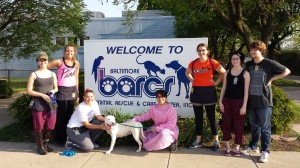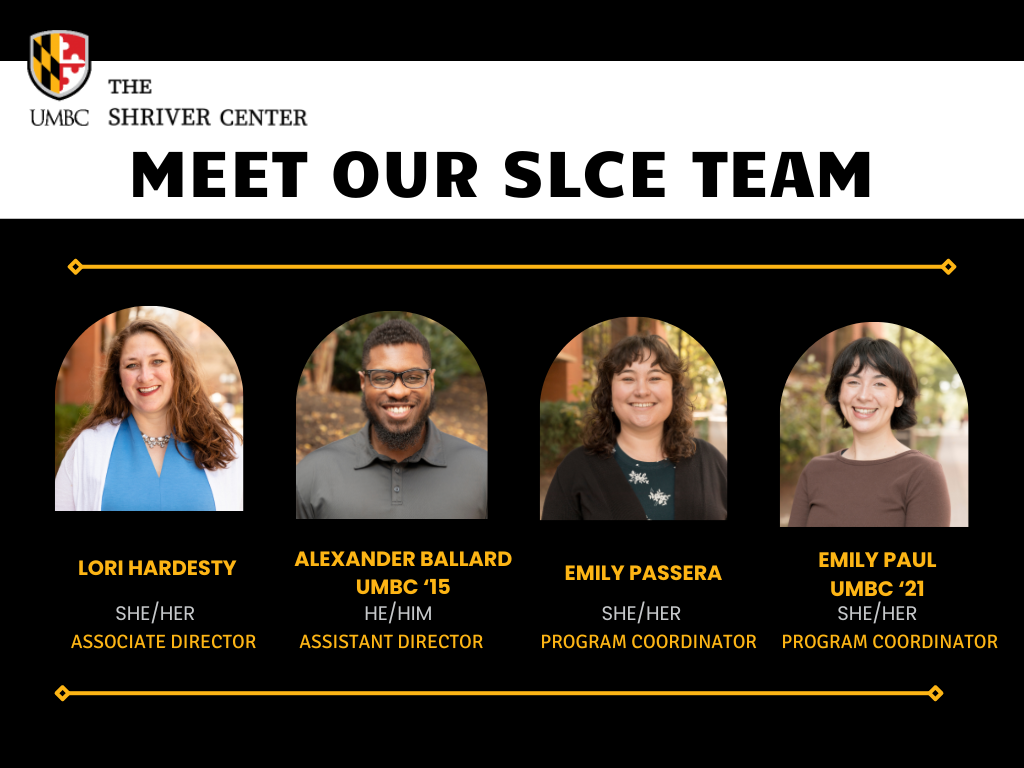What is Service-Learning & Community Engagement?
Service-Learning engages students in weekly service with a designated service placement. Through this sustained partnership, students build relationships with whom they serve. Service-Learning also allows students the opportunity to engage in formal and informal reflections on their service, which allow students to connect their service with their learning. Service-Learning is a connector program for various Shriver Center and UMBC initiatives.

The 096 Community Service & Learning Practicum allows for students to engage in weekly service and reflection through the enrollment in a zero-credit, pass/fail course. In FY19, The Shriver Center coordinated over 900 placements with close to 60 different community partners.
Every semester, the Center collects data from UMBCworks describing the impact of service-learning and community engagement on student learning and development. Students report the impact of their experiences on their cognitive functional competencies (e.g., critical analysis and reasoning, Student/Self Survey, n=845) as well as their professional and affective/personal development (Placement/Site Survey, n=838). Findings from this year’s assessment include:
- 96% of service-learning respondents would recommend an internship/work/co-op-research/service placement to another student.
- 93% of service-learning respondents reported that their interpersonal communication skills increased as a direct result of their applied experience;
- 88% of service-learning respondents indicated that their awareness of civic responsibilities increased as a direct result of their applied experience;
- 87% of service-learning respondents agreed that participating in applied learning helped them to grow as a leader;
- 85% of service-learning respondents indicated that their ability to solve problems increased as a result of their applied learning experience;
- 84% of service-learning respondents agreed that their skills in teamwork and collaboration increased as a direct result of their applied experience;
- 83% of service-learning respondents reported increased their intercultural awareness and perspective increased as a direct result of their applied experience;
- 78% of service-learning respondents indicated that their self-confidence increased as a direct result of their applied experience;
- 78% of service-learning respondents agreed that their ability to apply their education to work increased as a result of their applied learning experience;
- 73% of service-learning respondents indicated that their oral presentation skills increased as a direct result of their applied experience;
- 70% of service-learning respondents agreed that their ability to view their career expectations realistically increased as a result of their applied learning experience;
- 68% of service-learning respondents indicated that the clarity of their career goals increased as a result of their applied learning experiences;
- 67% of service-learning respondents indicated that their motivation to continue and persist to graduation increased as a direct result of their applied experience;
- 67% of service-learning respondents indicated that their applied learning experience related to their major or career goals;
Staff work closely with students to choose their service sites based upon their passions, goals, interests and availability. Currently, the Shriver Center has community partnerships with organizations that focus on various issue areas that serve diverse populations. These include, but are not limited to, animal welfare, education, the environment, food and housing access, healthcare and mental health.
Student Information:
If you are interested in participating in Service-Learning, please visit the 096 Service-Learning Practicum page. Please note that we will continue to update our service chart as new information becomes available (Sites fill, updates on orientation, etc.)
Faculty Information:
If you are interested in incorporating Service-Learning into a current or future academic course, please set up a meeting with a Shriver or Service-Learning Staff.
Community Partner Information:
If you are interested in having UMBC students volunteer with your organization, please look over our Community Partner Packet. Contact Service-Learning Staff to discuss existing and future partnerships.

Alex Ballard
Assistant Director, Applied Learning & Community Engagement
Emily Passera
Program Coordinator, Service-Learning & Community Engagement
Emily Paul
Program Specialist, Service-Learning & Community Engagement
Lori L. Hardesty
Associate Director, Applied Learning & Community Engagement